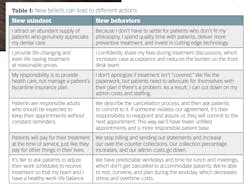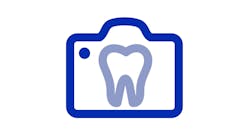Even the most confident, self-assured dentists may develop self-esteem problems based on their patient interactions. Let’s test if you’re vulnerable. Give yourself one point if:
- You’ve ever had a patient say to you, “I hate coming to the dentist.”
- Your front desk team spends countless hours texting, emailing, and calling patients to remind them about their appointments, only for those patients to no-show anyway and become indignant when they’re charged a no-show fee.
- You’ve spent 20 minutes with a patient sharing their x-rays, pictures, and models, only for the patient to say they’ll think about it because they want to spend the money on Disneyland, or insurance might not fully cover it, or they’re just too busy.
- Patients tell you they self-diagnosed their issue and did some DIY dental work based on a TikTok video.
Who wouldn’t have self-esteem issues? But—and here’s a direct and harsh question—have dentists inadvertently contributed to devaluing their own profession? Before you protest, let’s examine this honestly. While I’m not a big fan of Dr. Phil, he said one thing I found insightful: we teach people how to treat us.
Enjoy more by Sharyn Weiss: Talking fees with your dental patients: Why it's your job (or should be)
Is it possible that dentists inadvertently teach patients to diminish the worth of dental care and behave with disrespect? After 20-plus years as a practice management consultant, I’ve seen how dentists and their teams sometimes enable patients to behave badly.
Here’s another quiz. Give yourself a demerit if you or your team ever:
- Minimize treatment with terms like “just” or “little” or “patch” or “cleaning” so patients aren’t too alarmed.
- Apologize if a patient has any out-of-pocket cost because the insurance company has more credibility than you.
- Beg, plead, and cajole patients to show up to their appointments, as if they’re doing you a favor.
- Consistently threaten to fine chronic no-shows but reappoint them anyway.
- Engage full-time employees to navigate patients’ insurance plans because patients don’t want to do this for themselves.
- Hesitate to charge fees that are commensurate with your services because patients will complain if there’s even a small increase.
- Open early or stay late to see patients who believe you should accommodate their work schedules as if their health is less important than their job or your time.
- Ask patients if they want to pay today and if they don’t, cheerfully assume all the costs for their treatment until they get around to writing you a check.
When customer service becomes codependence
Mental Health America defines codependency as an “emotional and behavioral condition that affects an individual's ability to have a healthy, mutually satisfying relationship.” Note the term “mutually satisfying” implies that both parties have their goals and needs met. But what I’ve observed is that under the guise of customer service, dentists often become the underdogs in their patient relationships.
I’ve wondered why these behaviors are so common in dental offices. I can’t imagine many cardiologists have these issues. Do their patients routinely miss appointments or arrive late? Do their patients demand that the admin team research their insurance benefits? Do their patients declare they’ll have one valve done this year and one next year? Why do dental patients balk at paying $150 for their hygiene appointments but plunk down $500 or more to clean their dog’s teeth? Is there something unique about dental patients or is there something amiss with dentists?
Adjusting your mindset
Imagine a different scenario. Let’s pretend that dentists have a different, less codependent mindset. Because behavior correlates to attitudes, let’s look at how new beliefs could lead to different actions.
How would you change?
These behavior and systems changes are possible if you shift your beliefs. It begins with knowing you’ll always be able to attract and retain patients who fit your philosophy. You’ll still provide compassionate customer service, but you’ll have healthier and more responsive patient relationships. I imagine this can all help to restore dentists’ self-esteem.
Editor's note: This article appeared in the May 2023 print edition of Dental Economics magazine. Dentists in North America are eligible for a complimentary print subscription. Sign up here.








